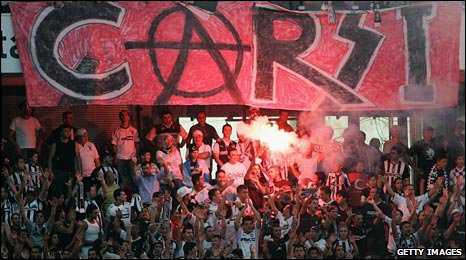
“Football isn’t just a sport. Nowadays it’s an industry,” says Besiktas fan Ozan Ilhan ahead of his side’s clash with Manchester United on Wednesday.
The smallest of Turkey’s “big three”, Besiktas are seen in their country as the halk takim, the people’s team.
The team’s fan base is traditionally more working-class and left-wing than those of rivals Galatasaray and Fenerbahce, and their supporters’ club, Carsi, takes this history to heart.
Formed by six teenagers in 1980, Carsi is now a thousands-strong organisation that, unusually, marries fanaticism for the team with political causes.
Ozan is a 24-year-old student who lives in the German city of Koblenz, and works in the city’s car industry.
He is one of the 1,000 or so Carsi members making the trip to Manchester.
“My wife cannot understand me,” he complains. “She says: ‘Why fly to Manchester for Besiktas? You can watch it at home on the television.’”
They are coming from all over Europe – 150 from Germany, 50 from Holland, 50 from London – for a match they probably won’t win and, even if they do, has no bearing on them qualifying for the next stage.
“Carsi is like a spirit,” says Devrim Borcek, another fan from Germany.
“Those living in Istanbul are close to Besiktas. I’m living 3000km away but I have to live the same as these guys.”
But this is more than an ordinary supporters’ club trip.
Carsi is a hive of activity, both at matches and away from the stadium.
It has a changing cast of members but, for the core, the group is central to their lives.
Together they take part in Labour Day marches, do charity work, produce placards for matches, and even protest against government nuclear policy – or just meet up to drink and talk about football.
Fans are introduced to ideas like anarchism and socialism that don’t get an airing in traditional media, let alone most football stadia.
By contrast, the fans they will encounter on Wednesday have been dubbed the “prawn sandwich brigade” for their corporate approach to supporting a team.
So how do Carsi members feel about Manchester United fans?
Ozan respects United’s history and success, if not their fans’ style of support.
“They are a good example of people who like the football industry, who like to go to the stadium, watch the match and go home,” he says.
“That’s not the culture of Besiktas. We have to scream whether we win or lose – all that matters is the atmosphere, the expectation that you are not only there but you are living it.
“I cannot imagine Besiktas like Manchester. It’s not possible and I don’t want it.”
But they do want to be successful. Although winners of the Turkish league last year, Besiktas are currently at the bottom of Champions League group B, yet to win a European match this season.
Those in charge need to decide whether triumph on the European stage can be achieved without diluting the club’s identity, in an age in which success increasingly depends on money.
The club’s efforts to boost revenue have seen Carsi lose out.
Ticket prices have increased year on year, making it harder for the traditional fanbase to attend.
Seats in Carsi’s section for last Saturday’s derby against Fenerbahce cost 250 Lira (£100) – more than all but the most expensive tickets at Old Trafford.
“The three big clubs in Turkey – Besiktas, Galatasaray, Fenerbahce – their presidents don’t want these fans in the stadium,” a Turkish journalist tells me.
“Like in England, they want rich fans.”
Where next for Carsi, then, if the club no longer wants them?
The globalisation of the game has brought the group opportunities and threats in equal measure.
Some members worry its 1980s collectivist ideology doesn’t resonate with younger fans in an era of multi-million pound transfers and instant success.
But televised games, the internet and cheap European flights have brought more people into the Carsi fold.
Widespread publicity means the movement has become a magnet for those disenchanted with “typical” football fans, or even Turkish society in general.
They are fighting for a vision of what it means to be a fan – an all-consuming relationship with the club that they believe is alien to most in English football.
And so to Old Trafford, the 76,000-capacity, all-seated cathedral for the modern game.
“It will be a hard match, I think,” says Ozan.
“Our chances aren’t good. But remember the match in 2003 against Chelsea, when nobody expected Besiktas to win. It was wonderful, so why not again?”
BBC

Leave a Reply